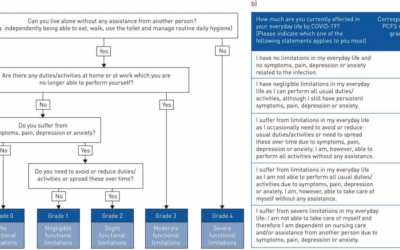Brad S. Lichtenstein, ND
Said the patient: “I meditate daily, but I’m not doing it great. My diet is pretty good, but not great. I take my supplements, but I’m not doing it great.” With these words, Sally was off and running.
This sentiment—that only if “I try hard enough and perform perfectly” will I get better—has been echoed repeatedly by patients over the years, and we as healthcare providers perpetuate it, I believe. Such thinking encourages the “bargaining stage” as described by Elisabeth Kübler-Ross, MD, in her seminal work On Death and Dying.1 When faced with a terminal illness or catastrophic event, Kübler-Ross observed that one moves through several stages of grief, although not necessarily in a linear fashion. She outlined these stages as denial, anger, bargaining, depression, and acceptance.
In the denial stage, the individual denies that anything is wrong or that any issue for closer inspection exists. In the anger stage, the individual focuses on fairness by lashing out and blaming self, others, the world, or God. In the bargaining stage, the individual is in a state of constant negotiation, believing that if he or she does x, y, and z perfectly, the inevitable will be postponed, or a complete cure may be found. In the depression stage, the individual feels hopeless and asks “why bother?” Finally, if the acceptance stage is reached, the individual comes to terms with the trauma, diagnosis, or reality and integrates it fully into his or her psyche and life.
From an integrative mind-body medicine perspective, I argue that much more attention needs to be paid to the patient-practitioner relationship. In fact, most healing begins with this exchange. By attending to this dynamic relationship, physicians instantly address all the principles of naturopathic medicine: these include the healing power of nature, first do no harm, treat the cause, treat the whole, docere, and prevention. Let me connect the dots:
This issue of NDNR is focused on mind-body medicine. The National Center for Complementary and Alternative Medicine defines mind-body medicine as any approach that enhances the “interactions among the brain, mind, body and behavior, and on the powerful ways in which emotional, mental, social, spiritual, and behavioral factors can directly affect health”2(p1) and describes the techniques as “intervention strategies believed to promote health; [such as] relaxation, hypnosis, visual imagery, meditation, yoga, biofeedback, tai chi, qi gong, cognitive-behavioral therapies, group support, autogenic training, and spirituality.”2(p1) However, I find it misguided to think about mind-body medicine in terms of modalities or techniques but instead prefer to frame it as “attitudinal” or “intentional” healing, in which the relationship between patient and provider is an attitude and intention in and of itself. We must emphasize first and foremost this interaction because what is established within the first 5 minutes of any session can set the tone for all future healing.
Current discussions in psychology and neuroscience about attachment theory explore how interactions with earliest caregivers influence neurological development. If these relationships are strained in any direction, the influence can cause us to become hardwired for anxiety or avoidance (theorist-proposed additional attachment styles since John Bowlby first described the attachment theory) in all potential future relationships. Fortunately, evidence for “neuroplasticity” is mounting, suggesting that methods to increase peace, calm, and tranquility can over time reshape our habituated entrenched neural pathways and thereby alter our brain’s ability to relate to others, the world, and ourselves. While a discussion of the details of attachment theory is beyond the scope of this article, my objective herein is to stress the importance of cultivating rapport as the first step in creating health.
The mournful remarks by patient Sally about her failure at meditating, eating, or supplement taking prompted me to ask my favorite question: “So what?”
In no way am I trying to be flippant, disrespectful, dismissive, invalidating, or inconsiderate. I am seriously querying the relevance of such actions. In other words, I wish to explore her attitudes and intentions. However, what followed was that Sally defended a litany of protocols and practices given to her by a naturopathic nutritionist, consisting of bad foods vs good foods, herbs, supplements, and meditations for cancer. I cannot help but wonder how such lists serve patients? For Sally, bad vs good only provoked anxiety and fear, as well as perpetuating her proclivity toward self-deprecation and self-abasement and her lack of faith that one can control life’s outcomes.
I have frequently been asked by patients if I was going to make them pray, if meditation would heal cancer, or if I could teach them to not be anxious. I tell them that my work has a singular focus: the exploration of how one wishes to live given the reality of the moment. Period. It is not to eliminate anxiety, alleviate depression, or eradicate cancer. When younger, I often remarked how I wished that patients never had to deal with cancer or human immunodeficiency virus (HIV). I have grown less arrogant over the years and have recognized that my assessments of their situations were not necessarily congruent with theirs. No one, including a provider, knows what is best or is healing for another. I have heard countless times how illness was transformative and the individual was forever changed by his or her particular illness, even when it resulted in death. This is not the same as concluding that cancer or whatever disease the person has was “meant to be.” The meaning given to it, the relationship of individuals with their illness, reflects the stages of grief as defined by Kübler-Ross.1 If we wish to incite bargaining, then the way we discuss treatment and care is critical. Do we wish to promote anxiety and depression or cultivate acceptance of what is happening in life right now (keeping in mind that acceptance is not the same as surrender and inactivity)? By definition, bargaining means that no peace can be found in the moment because one is constantly leaning toward the future and dreaming of a different life.
How often have we heard a patient sheepishly apologize for failing to comply with our treatment recommendations? Several points need to be addressed when we notice such behavior: For whom does this patient work? For us or for self? I believe that a provider works for his or her patients. However, to be invested in our patients’ well-being does not mean that we are distraught when they do not heed what we think is best; instead, we can be curious about their underlying motivations for their behavior. Furthermore, guilt fosters stress and the constant evaluation that one is not good enough. Is that the attitude we wish to instill in our patients? Moreover, can we guarantee that patients will get better if they follow our recommendations to the letter? What if they do not?
Some have misinterpreted this line of thinking to mean I am advocating that we censor or ignore our strong ideas about treatment. Clearly, patients pay us for our medical opinions that have been shaped by years of experience, evidence, and research, comprising all that we have seen in clinical practice. When my HIV-positive patient with Karposi sarcoma complained of an inability to swallow, I saw a quarter-sized lesion growing off his uvula that had not been there only 2 weeks prior. He was adamant about refusing drugs, and I supported his values, while emphasizing my opinion that, left untreated, he would probably suffocate to death within a month, if not sooner. Asking him how he would like to proceed, keeping that in mind, we talked about options. Deciding that now was not the time he wished to die, especially in that manner, he allowed me to call an oncology and HIV specialist and set up an appointment for later that day. Preparing him for what to expect, I explained how this physician would most likely chastise him for not initiating antiretroviral therapy, suggest surgery and chemotherapy, and discuss Karposi sarcoma treatment in general, all of which came to pass. Having this discussion helped the patient clarify his goals, foster his intention, and strengthen his resolve.
Approaching our patients from this perspective requires the precious commodity of time. Such generative conversations cannot happen within a span of 7 to 8 minutes, yet they do not necessarily demand several hours either. In addition, we must be comfortable with worldviews different from our own. Ultimately, value systems are the basis for our motivations. To treat the cause of a patient’s illness, dear physicians, we must delve into the murky world of ideas, attitudes, dreams, fears, and concepts. If we are unwilling to enter that world, we will be left working with only a portion of the individual.
 Brad S. Lichtenstein, ND is a graduate of Bastyr University, where he is currently Assistant & Clinical Professor in the Department of Counseling and Health Psychology. The focus of his work explores helping people create psycho-emotional-spiritual wellness in the midst of living with a chronic, life-challenging illness. For several years he was the lead for Mindbody Medicine care at the Bastyr Integrative Oncology Research Center (BIORC) providing counseling, biofeedback, meditation, and other PNI approaches. For three years, he was involved in a joint research study between Bastyr University and University of Washington evaluating the impact of meditation and massage on end-of-life care and the quality of death. During this time, he leads over 500 guided meditations to hospice patients in biweekly sessions. In addition to his faculty position at Bastyr, Dr Lichtenstein maintains a private practice, leads group workshops and lectures, and writes.
Brad S. Lichtenstein, ND is a graduate of Bastyr University, where he is currently Assistant & Clinical Professor in the Department of Counseling and Health Psychology. The focus of his work explores helping people create psycho-emotional-spiritual wellness in the midst of living with a chronic, life-challenging illness. For several years he was the lead for Mindbody Medicine care at the Bastyr Integrative Oncology Research Center (BIORC) providing counseling, biofeedback, meditation, and other PNI approaches. For three years, he was involved in a joint research study between Bastyr University and University of Washington evaluating the impact of meditation and massage on end-of-life care and the quality of death. During this time, he leads over 500 guided meditations to hospice patients in biweekly sessions. In addition to his faculty position at Bastyr, Dr Lichtenstein maintains a private practice, leads group workshops and lectures, and writes.
References
Kübler-Ross E. On Death and Dying. New York, NY: Simon & Schuster; 1997.
National Center for Complementary and Alternative Medicine. Mind-body medicine: An overview. In: Backgrounder; May 2007:1.






















